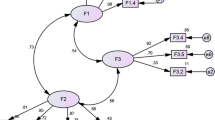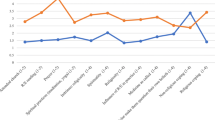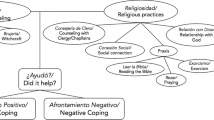Abstract
Objective To develop a self-report questionnaire to measure the beliefs of Arabic primary care patients about the causes of their physical symptoms; to use this to quantify the beliefs of patients consulting their general practitioners (GPs) in Saudi Arabia; and to test whether patients with psychological problems differ from others in their beliefs, particularly religious and supernatural beliefs. Methods Consecutive patients (N = 224) completed a specially developed aetiological beliefs’ questionnaire. Patients were divided into two groups (cases and non-cases of emotional disorder) according to the GHQ-12. Results Religious and supernatural aspects of culture colour patients’ symptom beliefs: that their symptoms were a test or punishment from Allah’ was the most common belief. Even in non-cases, around half the patients also endorsed nerves and stress as a cause of their physical symptoms. Cases were more likely than non-cases to endorse items related to both religious and psychological factors. Conclusion There is no support for the view that Saudi Arabian patients explain symptoms supernaturally as a way of denying psychological factors. GPs and health professionals in Saudi primary care need to understand what patients believe to be the cause of their problems and to appreciate that religious and psychological beliefs are both very common. GPs should address psychological beliefs and concerns even with those patients who present physical symptoms.
Similar content being viewed by others
References
Al-Faris, E. (1998). Toward a campaign to combat psychological disorders in the community. Annals of Saudi Medicine, 18, 205–207.
Al-Faris, E. (2000). The prevalence of Abnormal results of annual investigations among diabetic patients with different risk factors. Annals of Saudi Medicine, 20, 206–210.
Al-Krenawi, A., & Graham, J. (2000). Culturally sensitive social work practice with Arab clients in mental health settings. Health and Social Work, 25, 9–22.
Al-Krenawi, A., Graham, J., & Maoz, B. (2000). Gendered utilization differences of mental health services in Jordan. Community Mental Health Journal, 36, 501–511.
Becker, S. (2004). Detection of somatization and depression in primary care in Saudi Arabia. Social Psychiatry and Psychiatric Epidemiology, 36, 962–966.
Boyer, L. (1983). Approaching cross-cultural psychotherapy. Journal of Psychoanalytic Anthropology, 6, 237–245.
Dwairy, M. (1998). Mental health in the Arab world. In A. H. Bellack. (Ed.), Comprehensive clinical psychology: Sociocultural and individual differences (Vol. 10). New York: Pergamon Press.
Dwairy, M., & Van Sickle, T. (1996). Western psychotherapy in traditional Arabic societies. Clinical Psychology Review, 16, 231–249.
Eisenbruch, M. (1990). Classification of natural and supernatural causes of mental distress. Development of a mental distress explanatory model questionnaire. Journal of Nervous and Mental Disease, 178, 712–719.
El-Rufaie, O., & Daradkeh, T. (1996). Validation of the Arabic versions of the thirty- and twelve-item general health questionnaires in primary care patients. The British Journal of Psychiatry, 169, 662–664.
Goldberg, D., & Bridges, K. (1988). Somatic presentations of psychiatric illness in primary care setting. Journal of Psychosomatic Research, 32, 137–144.
Henningsen, P., Zimmermann, T., & Sattel, H. (2003). Medically unexplained physical symptoms, anxiety, and depression: A meta-analytic review. Psychosomatic Medicine, 65, 528–533.
Hussain, R. (2002). Lay perceptions of genetic risks attributable to inbreeding in Pakistan. American Journal of Human Biology, 14, 264–274.
Kalantan, K., Mohamed, A., Al-Taweel, A., & Abdul Ghani, H. (2001). Hypertension among attendants of primary health care centers in Al-Qassim region, Saudi Arabia. Saudi Medical Journal, 22, 960–963.
Kirmayer, L., & Robbins, J. (1996). Patients who somatize in primary care: A longitudinal study of cognitive and social characteristics. Psychological Medicine, 26, 937–951.
Kurihara, T., Kato, M., Sakamoto, S., Reverger, R., & Kitamura, T. (2000). Public attitudes towards the mentally ill: A cross cultural study between Bali and Tokyo. Psychiatry and Clinical Neurosciences, 54, 547–552.
Kuyck, W., Wit, N., & Kuyvenhoven, M. (2000). Do doctors pay attention to religious beliefs of their patients? A survey amongst Dutch GPs. Family Practice, 17, 230–232.
Ossman, A., Alkhateeb, S., & Ali, A. (1993). The Pattern of admission to Jeddah psychiatric Hospital. Saudi Medicine Journal, 14, 334–339.
Peters, S., Stanley, I., Rose, M., & Salmon, P. (1998). Patients with medically unexplained symptoms: Sources of patients' authority and implications for demands on medical care. Social Science & Medicine, 46, 559–565.
Pieroni, A., & Quave, C. (2005). Traditional pharmacopoeias and medicines among Albanians and Italians in southern Italy. Journal of Ethnopharmacology, 101, 258–270.
Salmon, P., Woloshynowych, M., & Valori, R. (1996). The measurement of beliefs about physical symptoms in english general practice patients. Social Science and Medicine, 42, 1561–1567.
Salmon, P. (2000). The psychology of medicine and surgery: A guide for psychologists, doctors, nurses and counsellors. Chichester: Wiley.
Shahin, S., & Daly, E. (1999). Knowledge, attitude and beliefs about psychotropic medication among Saudi hospitalized psychiatric patients. International Journal of Nursing Studies, 36, 51–55.
Sheikh, S., & Furnham, A. (2000). A cross-cultural study of mental health beliefs and attitudes towards seeking professional help. Social Psychiatry and Psychiatric Epidemiology, 35, 326–334.
Wahid, S., Al Shammary, F., Khoja, T., Hashim, T., Anokute, C., & Khan, S. (1996). Prevalence of hypertension and sociodemographic characteristics of adult hypertensives in Riyadh City, Saudi Arabia. Journal of Human Hypertension, 10, 583–587.
Woloshynowych, M., Valori, R., & Salmon, P. (1998). General practice patients' beliefs about their symptoms. British Journal of General Practice, 48, 885–889.
Zurba, F., & Garf, A. (1996). Prevalence of diabetes mellitus among Bahrainis attending primary health care centers. Eastern Mediterranean Health Journal, 2, 274–282.
Author information
Authors and Affiliations
Corresponding author
Rights and permissions
About this article
Cite this article
Alqahtani, M.M., Salmon, P. Cultural Influences in the Aetiological Beliefs of Saudi Arabian Primary Care Patients About Their Symptoms: The Association of Religious and Psychological Beliefs. J Relig Health 47, 302–313 (2008). https://doi.org/10.1007/s10943-008-9163-4
Received:
Accepted:
Published:
Issue Date:
DOI: https://doi.org/10.1007/s10943-008-9163-4




